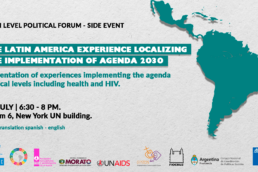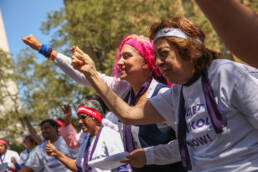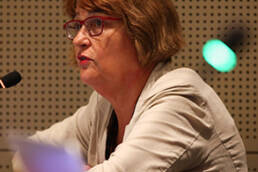Leaving no one behind in recovering better. How can we identify those left behind and how can we provide social protection and other measures to contribute to more equal societies and build resilience?
Watch our official session at the High Level Political Forum 2022, hosted on 12 July 2022:
About the session
The role of the Major Groups and Other Stakeholders (MGoS) in the implementation, follow-up and review of the Sustainable Development Goas was established by the General Assembly in its resolution 67/290 and in paragraph 89 of the 2030 Agenda. The role of civil society in ensuring that no one is left behind cannot be underestimated. This session, organized by the Coordination Mechanism of the MGoS, will discuss pathways for moving forward in the post COVID-19 recovery and advancing the 2030 Agenda. It will address the urgent need for expansion of policy and fiscal space of developing countries through systemic reforms and financing policies that can ensure better alignment between social, ecological, economic and climate priorities.
Session report
HLPF 2022 Highlights: Tuesday, 12 July 2022 within the HLPF, the Mayor Group and other Stakeholders Coordination Mechanism –MGoS CM- organized a special session where civil society represents participated and held dialogue government officials.
The Panel: Vision of Civil Society: Leaving No One Behind in Recovering Better. How can we identify those left behind and how can we provide social protection and other measures to contribute to more equal societies and build resilience?
The session was opened by the ECOSOC president, Botswana´s ambassador Coleen Kelapile, who urged an interactive discussion that promotes a step forward including the civil society´s vision in the topics within the HLPF. He emphasized how urgent it is to apply and reform policies that secure a promotion of social, political, economic and environmental priorities. He thanked excellences and delegates.
Following the ambassador, Liu Zhenmin, UN Under-Secretary-General for Economic and Social Affairs, highlighted the important role of civil society in reaching those furthest behind, and their valuable role in informing the 2023 Summit, emphasizing “we need to hear your diverse voices everywhere.”
MGoS Coordination Mechanism Co-Chair, Mabel Bianco, President, Fundacion para Estudio e Investigación de la Mujer, recalled the optimism that led the events of 2015 to the civil society as well as the appreciation that had felt at the adoption of the 2030 Agenda, but noted progress is lacking. “Seven year after this, we express our concern due to the lack of progress and event reprocess in the few indicators that had got better. She urged governments to make meaningful political commitments that leave no one behind. Also, she reminded the 2015 objectives: “We need to recover the ambition that we had in 2015 and follow through with concrete actions. This is what we ask. Not just simply make a good ministerial declaration, but to give answers to the people. The people who aren’t here, the people who are suffering, the people left behind and for which we have the obligation to bring their voice and claims”.
MGoS Coordination Mechanism Co-Chair, Ajay Jha, Director, Center for Community Economics and Development Consultants Society, India, moderated the session. Among civil society’s priorities, he highlighted the main concerns: the need to improve vaccine equity, given the fact that for instance Africa has less that 10% of vaccines; how necessary is to address the debt crisis, whilst more than 60 countries spent more on debt than on the development of social services last year; and stronger climate action. He thanked the countries that have helped and donated to these causes but he also noted that charity does not mean sustainable development.
Wezzie Chimwala, Monitoring and Evaluation Manager, Voluntary Services Overseas (VSO), Malawi, called for stronger government recognition of the value volunteers bring to SDG implementation and accountability.
Wali Haider, Focal Point for Farmers’ Major Group at UNEP, prioritized: access and control to land for a more sustainable prosperity; and community farming over corporate, industrial farming.
Emilia Reyes, Women’s Major Group, called out the “disaster profiteering,” creation of larger corporation in the global north making the global south suffer which prevents vaccine equity, and called for a fourth financing for development conference. In response to Ajay Jha questions, she also called out the failed solutions, empty language and the urgent need to strengthen the UN system and its internal dynamics. She urged the delegates to act on behalf of their historical role for the security of humanity and the planet and reminded that we only have three years for system change.
Speaking as a refugee from the war in Ukraine, Svetlana Slesarenok, Founder and Director, Black Sea Women’s Club, Odessa, stressed that the war is directly linked to fossil fuel extraction and urged an end in public investment in oil and gas.
Saad Alfarargi, UN Special Rapporteur on the Right to Development, said the right to development is a holistic, multistakeholder process, and underlined the need to revise tax and finance policy to address the concerns of the most vulnerable, including women.
Denison Jayasooria, All-Party Parliamentary Group Malaysia on SDGs, proposed the establishment of a 10-member panel under the auspices of ECOSOC on the status of civil society organization (CSO) engagement and participation.
Participants expressed concern over the diminishing space for civil society and political repression against CSOs in Belarus and Russia. They stressed the need to: improve education; end discrimination in the workplace and against older persons; improve economic transparency and revise fiscal regulations to curb tax evasion; and promote data collection and adopt datadriven solutions.
Delegates from different countries highlighted various efforts to include civil society in national and local SDG processes. They also noted the need to: address systemic barriers to equality such as sexism and misogyny; protect civic space and human rights defenders; combat disinformation; shift power to children, communities, and local organizations; and provide girls with high quality education and information on sexual and reproductive rights.
At the end of the session, Dr. Mabel Bianco added some final thoughts: “I must say that we, civil society and the government, need to work together. In my home country, Argentina, we have started to fight for the safe life of people and the care of the environment. This is what we call the green wave, marea verde. I invite all of you, government officials, to become members of the marea verde and do what we need you to do. This is what we need today, not tomorrow; that’s why we need all the commitment we have. We need a ministerial declaration that promotes concrete actions and that gets back the ambition and political compromises with the 2030 Agenda, not just words. Only by doing this we won´t anyone behind. Thank you very much.”
About HLPF 2022
The theme for the 2022 High Level Political Forum (5-15 July 2022) was ” Building back better from the coronavirus disease (COVID-19) while advancing the full implementation of the 2030 Agenda for Sustainable Development.”
As the world is struggling to recover from COVID-19 amidst continuing crises, the HLPF will reflect on how recovery policies can reverse the negative impacts of the pandemic on the SDGs and move countries on to a path to realize the vision of the 2030 Agenda.
The HLPF will also review in-depth Sustainable Development Goals 4 on quality education, 5 on gender equality, 14 on life below water, 15 on life on land, and 17 on partnerships for the Goals. It will take into account the different impacts of the COVID-19 pandemic across all Sustainable Development Goals and the integrated, indivisible and interlinked nature of the Goals.
44 countries will carry out voluntary national reviews (VNRs) of their implementation of the 2030 Agenda for Sustainable Development.
The HLPF will adopt the Ministerial Declaration as the outcome of its session. The President of ECOSOC will also prepare a summary to capture the key messages of the discussions.
The meeting of the HLPF in 2022 will be held from Tuesday, 5 July, to Thursday, 7 July, and from Monday, 11 July, to Friday, 15 July 2022 , under the auspices of the Economic and Social Council. This includes the three-day ministerial segment of the forum from Wednesday, 13 July, to Friday, 15 July 2022. The high-level segment of the Council will conclude with a final day on Monday, 18 July 2022.




